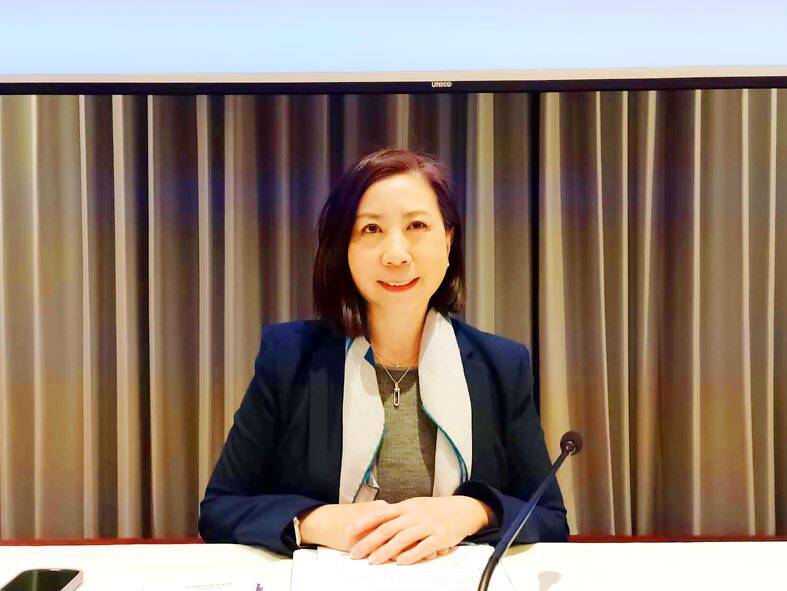CTBC Financial Holding Co (中信金控) would seek to maintain a 60 percent dividend payout ratio after it recorded profit of NT$72.03 billion (US$2.18 billion), or earnings per share of NT$3.64, last year, company president Rachael Kao (高麗雪) told an earnings conference in Taipei yesterday.
The board of directors at CTBC Financial would discuss the dividend policy next month, Kao said.
A proposed 60 percent payout ratio suggests a cash dividend of NT$2.18 per share.

Photo: Lee Chin-hui, Taipei Times
While uncertainty is escalating for financial markets this year, the landscape appears favorable for financial institutions, with the US Federal Reserve expected to cut interest rates in the next two quarters, which would benefit main subsidiary CTBC Bank’s (中信銀行) interest income and boost the asset value of its insurance arm, Taiwan Life Insurance Co (台灣人壽), Kao said.
Rate cuts would also help weaken the US dollar and spur loan demand, which are positive for interest income, she said, adding that the New Taiwan dollar is likely to remain volatile.
Separately, state-run Hua Nan Financial Holding Co (華南金控) said it would adopt a conservative approach to real-estate lending to support the efforts of Taiwan’s central bank’s to cool the housing market.
“Overall real-estate lending is expected to hold steady from last year, or change mildly,” Hua Nan Financial president Robert Li (李耀卿) told investors.
The conglomerate said that its flagship unit Hua Nan Commercial Bank (華南銀行) has more than NT$100 billion of pending construction loans and related mortgages.
The lender has halted new construction loan applications and sought to lower its real-estate lending from 40 percent to 39.4 percent of total loans, the conglomerate said.
Loans already approved would be disbursed in an orderly manner, with priority given to first-home buyers, owners of houses for self-occupancy and those who qualify for the government’s favorable lending terms, it said.
Hua Nan Bank is also eyeing deposit growth this year, particularly from small and medium-sized enterprises, as well as individual depositors, Hua Nan Financial said.

POWERING UP: PSUs for AI servers made up about 50% of Delta’s total server PSU revenue during the first three quarters of last year, the company said Power supply and electronic components maker Delta Electronics Inc (台達電) reported record-high revenue of NT$161.61 billion (US$5.11 billion) for last quarter and said it remains positive about this quarter. Last quarter’s figure was up 7.6 percent from the previous quarter and 41.51 percent higher than a year earlier, and largely in line with Yuanta Securities Investment Consulting Co’s (元大投顧) forecast of NT$160 billion. Delta’s annual revenue last year rose 31.76 percent year-on-year to NT$554.89 billion, also a record high for the company. Its strong performance reflected continued demand for high-performance power solutions and advanced liquid-cooling products used in artificial intelligence (AI) data centers,

SIZE MATTERS: TSMC started phasing out 8-inch wafer production last year, while Samsung is more aggressively retiring 8-inch capacity, TrendForce said Chipmakers are expected to raise prices of 8-inch wafers by up to 20 percent this year on concern over supply constraints as major contract chipmakers Taiwan Semiconductor Manufacturing Co (TSMC, 台積電) and Samsung Electronics Co gradually retire less advanced wafer capacity, TrendForce Corp (集邦科技) said yesterday. It is the first significant across-the-board price hike since a global semiconductor correction in 2023, the Taipei-based market researcher said in a report. Global 8-inch wafer capacity slid 0.3 percent year-on-year last year, although 8-inch wafer prices still hovered at relatively stable levels throughout the year, TrendForce said. The downward trend is expected to continue this year,

A proposed billionaires’ tax in California has ignited a political uproar in Silicon Valley, with tech titans threatening to leave the state while California Governor Gavin Newsom of the Democratic Party maneuvers to defeat a levy that he fears would lead to an exodus of wealth. A technology mecca, California has more billionaires than any other US state — a few hundred, by some estimates. About half its personal income tax revenue, a financial backbone in the nearly US$350 billion budget, comes from the top 1 percent of earners. A large healthcare union is attempting to place a proposal before

Vincent Wei led fellow Singaporean farmers around an empty Malaysian plot, laying out plans for a greenhouse and rows of leafy vegetables. What he pitched was not just space for crops, but a lifeline for growers struggling to make ends meet in a city-state with high prices and little vacant land. The future agriculture hub is part of a joint special economic zone launched last year by the two neighbors, expected to cost US$123 million and produce 10,000 tonnes of fresh produce annually. It is attracting Singaporean farmers with promises of cheaper land, labor and energy just over the border.